Kevin Clarke
Operetta Research Center
6 August, 2017
You could call this year’s Vogelhändler at the Mörbisch Festival a kick-ass production – or an erect middle-finger in the face of Austria’s hardcore operetta conservatives. As a reminder: when artistic director Dagmar Schellenberger mounted Paul Abraham’s Viktoria und ihr Husar in a large scale production last summer, there were many who claimed that the 1930 jazz operetta which premiered in Berlin originally (and not Vienna) was not a “real” operetta. It didn’t belong in Mörbisch, was the loudly uttered complaint. The direct consequence was: Miss Schellenberger was thrown out of office by the political representatives in the Burgenland region of Austria. As a farewell offering Miss Schellenberger has now selected Carl Zeller’s 1891 hit, which originally premiered at the Theater an der Wien with Alexander Girardi as Adam-the-bird-man. It doesn’t get much more “Austrian” than that, even if the action is set in the Rhine land, Germany. (But the character Adam is from Tyrol.) Now, the 2017 Mörbisch spectacle is available as a cast album and as a DVD, with two alternative casts.
One of the visually striking features of the production staged by Alex Köhler (with sets by Frank Philipp Schlössmann and costumes by Armella Müller von Blon) is the candy shop look: think Jeff Koons meets operetta, and add a touch of Moulin Rouge (choreography: Mirko Mahr).
Of course, little of that can be seen on the OEHMS Classics CD, there is only one photo of the production included in the booklet. It shows the oversized cuckoo clock – in pink! – at the center of the stage and hoards of dancers in dirndls swirling around. That’s it. But it gives you an idea, at least.

Cornelia Zink and Paul Schweinester with the ballet in “Der Vogelhändler,” 2017. (Photo: Seefestspiele Mörbisch/Jerzy Bin)
What you get on CD, instead of pop art, is an attempt to find new ways of singing and interpreting “Golden Viennese Operetta.” It’s quite interesting to witness, because on the one hand you notice that the young singers assembled here try something a little less ‘operatic’ than is standard in most other Austrian operetta venues, such as the Volksoper or Bad Ischl. Mention should especially go to Raimund Stangl as Schneck, the villager who gets to sing the opening song about no more wild boars being available for hunting (the second verse about no more virgins being available either is sadly cut). Stangl has a straightforward musical comedy voice that allows for easy text delivery and natural coloring of the music. He sets a standard, early on this CD, that I wish the others would have followed more noticeably.
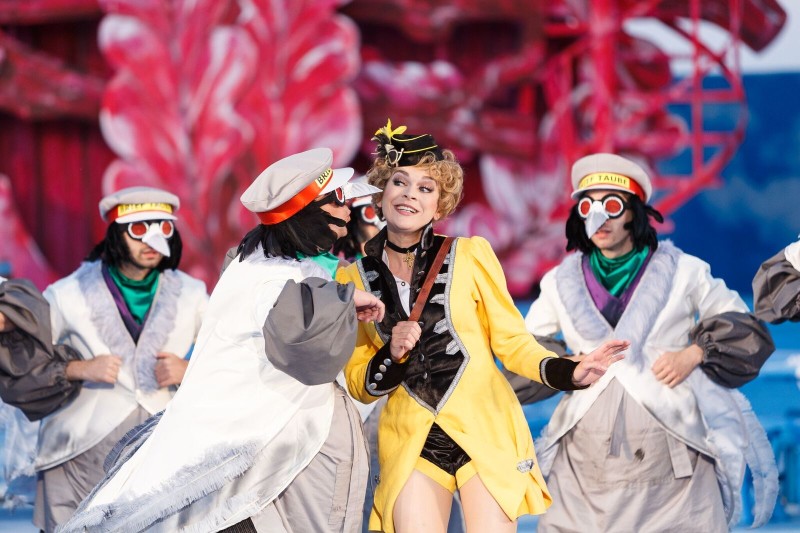
Sieglinde Feldhofer (as the alternative cast Christl) with the ballet in “Der Vogelhändler,” 2017. (Photo: Seefestspiele Mörbisch/Jerzy Bin)
Some of the others at least try, even if they are not as successful, possibly not daring to go ‘all the way’? Bernhard Berchtold is a fresh and eager Adam who avoids typical “operatics” but doesn’t possess a voice that can deliver an completly convincing alternative. Any Broadway type of leading man could have probably pulled this off better, giving this recording the comedy center that Vogelhändler ideally needs. Martina Fender as a young soubrette is even more reluctant to try something new. Her Christl from the German postal services is charmingly sung, but misses nearly every joke in the lyrics (about customers wanting to kiss her when she delivers letters … some of them even asking for ‘more’). There have been Christls in the past – even famous opera singers such as Elisabeth Schwarzkopf – who have found more linguistic fun in the entrance song.
And there are others, such as Lilli Claus, who have given a more overwhelming rendition of the glorious “Schenkt man sich Rosen in Tirol.” Fender is somewhere in-the-middle of them all, but offers a bubbly interpretation nonetheless. Again, a more Broadway style approach would have been welcome, especially because there are already so many (very good!) opera versions of Vogelhändler available. Also, because Mörbisch during the Schellenberger years offered various Broadway musicals. To bring the two elements together for this Vogelhändler finale would have been a truly innovative farewell gift to the operetta world at large.
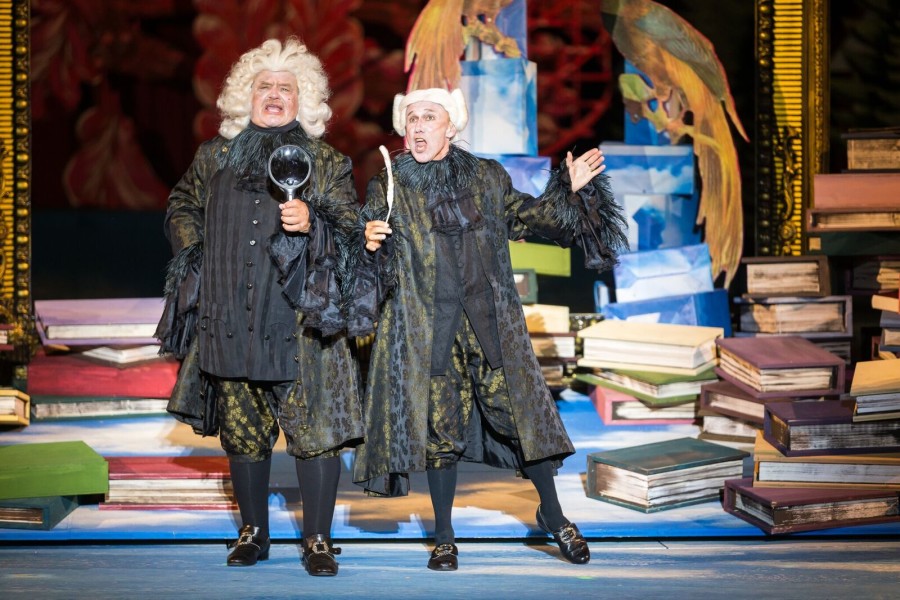
Wolfgang Dosch and Gerhard Ernst singing the “Prodekan” duet in “Der Vogelhändler,” 2017. (Photo: Seefestspiele Mörbisch/Jerzy Bin)
On the positive side, there are two operetta veterans – Wolfgang Dosch and Gerhard Ernst – who sing an irresistible “Ich bin der Prodekan.” It’s wonderful to listen to them, in every way. It’s among the very best versions of that catchy duet on record. And you can hear that they are having hilarious fun, as they should.
The same cannot be said of Elena Puszta as Kurfürstin Marie, Again, here is a young opera singer who tries not to sound ‘too’ operatic. But she doesn’t quite get to a convincing alternative either. Instead, you still hear the opera singer lowd and clear, and that invites comparisons with other opera singers of the past. If you have the recording with Hilde Güden as the Kurfürstin, swishing onto the sound stage with “Fröhlich Pfalz, Gott erhalt’s!” you’ll find Puszta a bit disappointing. Neither she nor anyone else gets a chance to counter-balance such impressions with boisterous dialogue. It’s not included on this single disc highlight version.
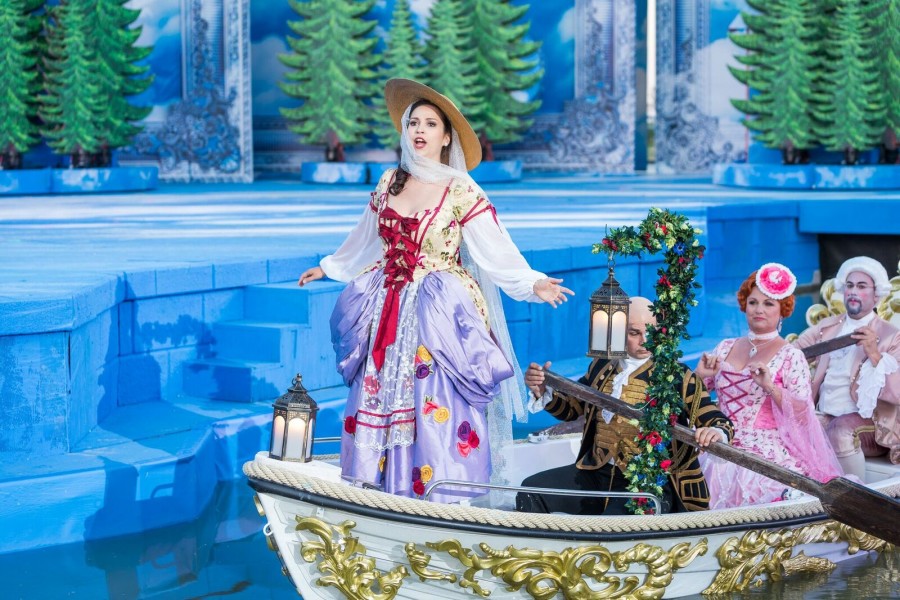
Elena Puszta (Kurfürstin Marie) arriving by boat with Dagmar Schellenberger (Adelaide) in “Der Vogelhändler,” 2017. (Photo: Seefestspiele Mörbisch/Jerzy Bin)
The Mörbisch Festival Orchestra, conducted by Gerrit Preißnitz, offers full and energetic playing, but sounds a bit unbalanced at times and rather brassy. It’s certainly not a musical approach that can be labeled a ‘rediscovery’ of Carl Zeller, even though this score has recently been newly edited and made available in a critical edition.
It’s the second Vogelhändler cast album to come from Mörbisch. The first was a 1998 version with Sebastian Reinthaler as an amazing Adam, conducted by Rudolf Bibl. Much as I personally prefer listening to operettas on CD, rather than watching them on DVD, I find the fully filmed version more rewarding in this case – because the pop-art-meets-operetta visuals are the more convincing aspect that needs to be seen. Maybe next time someone can attempt to make ‘pop art’ an audio experience too? Considering the sheer amount of ‘classic’ recordings – chief among them the 1956 recording featuring Julius Patzak as Adam, or the 1966 recording with Güden and Peter Minich as Adam, plus Lotte Schädle as Christl – it would be high time to offer an all-round new interpretation. Dagmar Schellenberger certainly tried this with her staging (and with herself as an attractive Adelaide). But she – or rather her conductor – did not have the creative imagination for an acoustic equivalent.
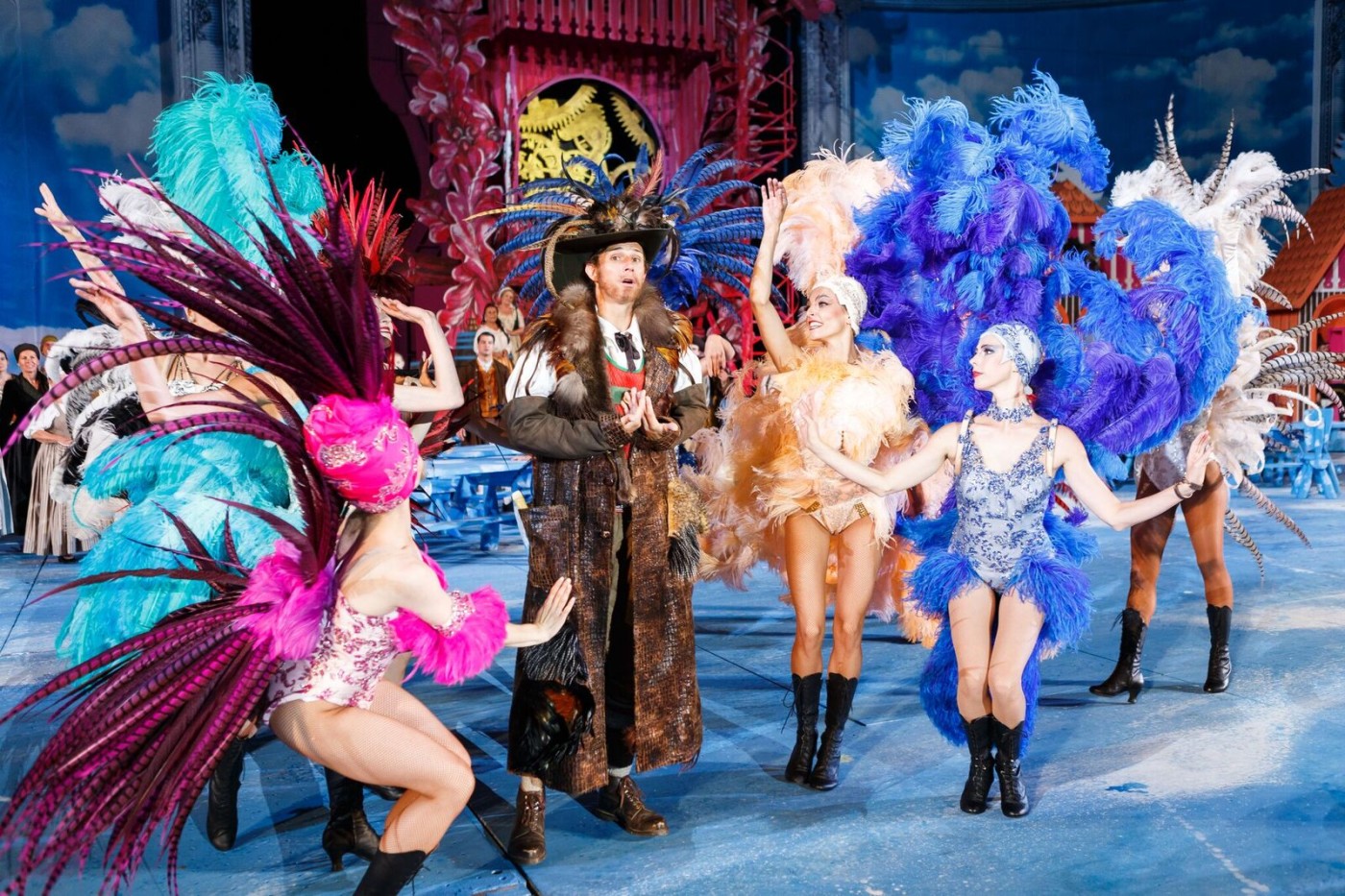
Paul Schweinester with the ballet in “Der Vogelhändler,” 2017. (Photo: Seefestspiele Mörbisch/Jerzy Bin)
Still, this 2017 Vogelhändler was a big success for the Mörbisch festival, a triumph for Miss Schellenberger over all the nay-sayers of the past. Her appointed successor – who wanted to bring a Robert Stolz operetta to Mörbisch in 2018 – has meanwhile been fired before he even started. In his place Peter Edelmann will take over, and he’s already announced that he wants to present “traditional” productions in the future. I assume that means no more Jeff Koons lookalike stagings. And even less musical innovation … leaving the path that Miss Schnellenberger has at least dared to try, with caution. So, in a way, this CD marks the end of an era when people in Austria actually cared about operetta being relevant and novel. Whether the ‘traditionalists’ will leave a mark in the future remains to be seen. If you look at Bad Ischl and Baden, where equally traditional artistic directors are at work, even if they claim otherwise, your hopes might remain muted.
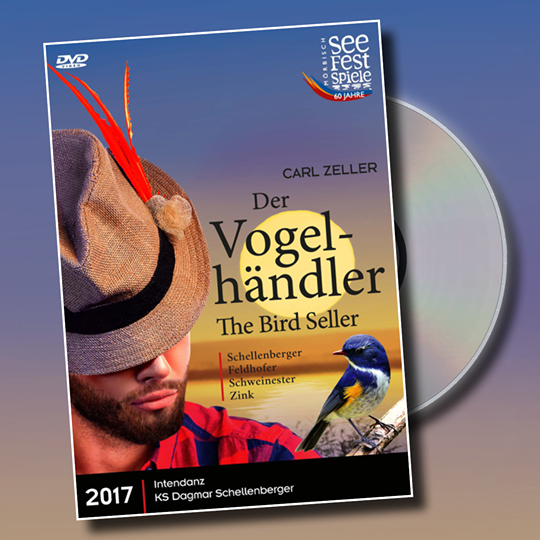
The “Vogelhändler” DVD is available through the Mörbisch festival web shop for 30 Euros.
It will be interesting to see where Miss Schellenberger goes next, and how her innovations might continue and fully blossom. There is a job opening at the Staatsoperette Dresden, and they are certainly a theater that could use some innovation. The Germans have also embraced novel types of operetta – in terms of choice of titles and style of production plus different kinds of casting – with much more enthusiasm. So there is defintely potential there to venture further than the Burgenland representatives (and the Austrian press) would allow before having a final heart attack.
So we say thank you for the music, Miss Schellenberger, and good luck for the future!
To buy the DVD directly through the Mörbisch Festival webshop, click here.
